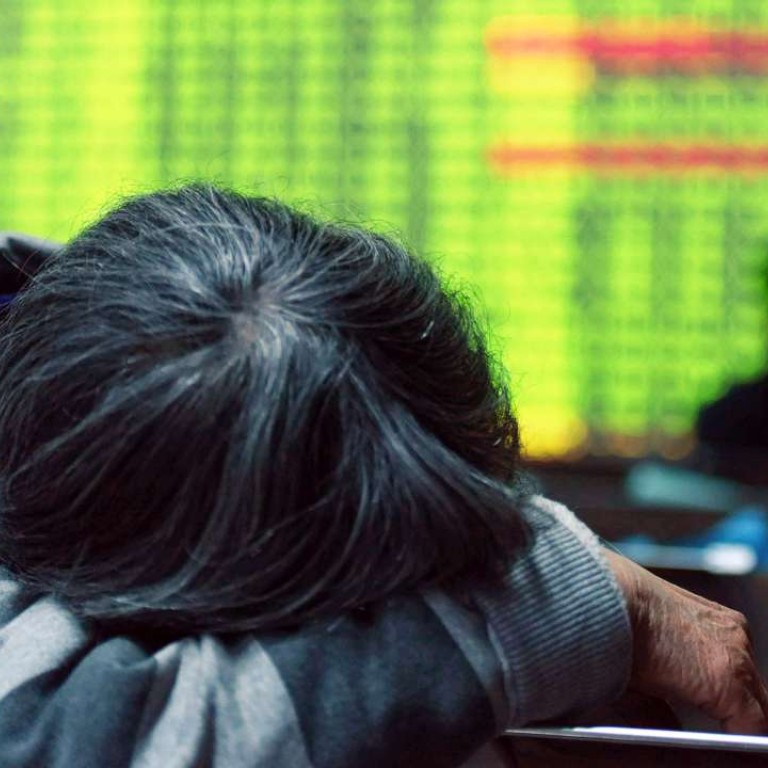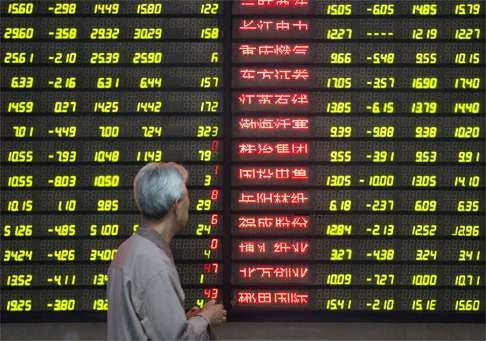
Hard landing: China brokerages look to cut bonuses, staff as markets snooze
Bye-bye fat red envelops. China’s securities brokerage companies are bracing for their very own hard landing as turnover on the stock markets plumbs depths not seen in more than one a half years.
“We now have a headcount freeze. The headquarters are cutting down on expenses, including overseas trips, to control costs. Things are becoming tight and there is no sign of any recovery,” said a senior executive at a China-based brokerage who did not want to be identified.
Many brokerages are delaying bonuses, which would run to several times the monthly pay in the go-go years.
China’s A-share stock market has been struggling to regain its momentum since the rout last summer. The benchmark Shanghai Composite Index briefly touched a high of 3,684.57 at the end of last year before the slide began.
As investors leave in droves, turnover on Shanghai and Shenzhen markets have dropped significantly from a year ago. On Tuesday, the Shanghai bourse recorded a turnover of 121.1 billion yuan (HK$143.42 billion), its lowest in 18 months. The current daily aggregate turnover in Shanghai and Shenzhen is only a fifth of what it used to be in April last year, when retail investors were flocking to the market.
And, brokerage companies are feeling the heat. An internal document of Founder Securities, a Hunan-based mid-sized securities brokerage, this week said the company was looking to either lay off 20 per cent of its employees or cut pay by 20 per cent “to improve the human resource structure” at a time when “the entire brokerage industry is facing headwinds due to the economic slowdown and a depressed secondary market”.
In a formal reply to Chinese financial media Caixin on Tuesday, the Shanghai-listed company said there is no specific lay-off target but it is working on “improving organisational efficiency” to weed out underperformers.
Founder’s headcount jumped 86 per cent last year from 2014 to 8,363, according to publicly available company information. Its net profit last year rose 126.3 per cent year on year to 4.1 billion yuan, but fell 12.6 per cent in the first quarter of this year.
Changjiang Securities, based in Hubei province, is also working on cost control measures, including trimming the senior management team, according to industry insiders.
Most Chinese brokerages’ revenue comes from trading commissions. Asset management and investment banking businesses account for a much smaller portion. With daily turnover plunging, so are commissions and commission rates as competition intensifies, said Nathan Ji, a brokerage analyst at a Shanghai-based mutual fund.
“Some securities companies expanded their teams during the bull run early last year. Now they are finding it difficult to justify the headcount amid declining turnover and commission income,” he said.
The Securities Association of China said the net profit of securities companies in China plunged 43 per cent year on year in the first quarter, mainly due to the high base effect from last year, when the only direction the market knew was up.
Last week, A shares extended their losing streak to a fifth straight week. They are on track to lose another 0.35 per cent this week.
Gao Ting, chief China strategist at UBS, said the prevailing sentiment in the market is one of caution and confusion. Uncertainty over policy would only “direct the market’s attention towards the negatives”, it said in a note on Monday.
After the habitual pump priming in the first quarter, Beijing’s orientation appears to be shifting following the interview of an anonymous “authoritative person” in the People’s Daily that stressed on the importance of reforms. It is being widely seen as a shadow boxing between reform-focused President Xi Jinping and Premier Li Keqiang, who is know to prioritise growth over reforms.

“But to date, apart from releasing the target for total capacity reduction, the government has neither announced the list of zombie enterprises nor put in place the personnel placement/subsidy plans. A strong signal for reforms is still lacking at the actual operational level,” Gao wrote in the note. “Thus the market is unable to make a clear judgement about the progress and effectiveness of the reforms.”
“Everyone is confused ... This is worrying as you may lose your job some day,” said a research analyst based in Hong Kong who preferred not to be named.
And, the worst is yet to come as an interest rate increase by the US Federal Reserve in June increasingly looks like a possibility. The Chinese yuan has already fallen to a three-month low against the greenback.
“An interest hike in the US will further weigh on the market, the analysts added.

